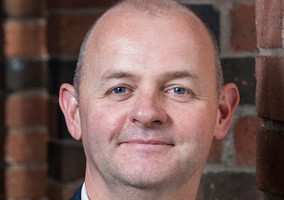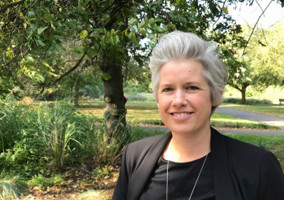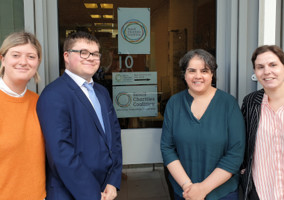Joining the Media Trust was an “incredibly serendipitous way to bring together both halves of my previous professional life”, says Su-Mei Thompson.
She has been chief executive of the trust for the last two years. But before that she worked in the media industry for 20 years and held senior management positions in Asia at the Walt Disney Company and the Financial Times.
She then became chief executive of the Women’s Foundation, an institution dedicated to the advancement of women in Hong Kong, for eight years.
For Thompson, the role at the Media Trust stimulates her every day. “You do not expect when you are 50 to find a job that really excites you every day. But it does. And, you know, the way that we use the power of the media to transform lives is really magical,” she reflects.
“While recognising all of the flaws of the media, I do passionately believe in the power of the media as an overall force for good,” she adds.
She sees the media “as an important critical friend” whose role “is to hold truth to power, and projects to account, especially where they involve public spending”.
At the same time, she sees dysfunctionality in how charities are funded and operate, and hopes that better training can help them to become more effective.
Increasing media representation of marginalised communities
The Media Trust focuses on increasing media representation of marginalised communities, as “a lot of the bias and the lack of understanding and empathy comes from media portrayals”.
“Even before Covid-19, I think what our mission was already felt incredibly relevant, because that media portrayal is so essential to societal attitudes. What we have been doing is helping marginalised communities to challenge stereotypes, fight for more authentic media representation, tell their stories, do advocacy and campaigning, and use digital and social media,” Thompson explains.
The charity has also been focusing on helping young people. Thompson says “a passion of mine all through my life has been to help young people from underprivileged backgrounds to achieve their potential”.
The Media Trust has young people's programmes “to help mostly underprivileged young people with the skills, support and access that they need to successfully break into the media, which is also good for the media because the under representation within the media is a driver of the media portrayals that we are seeing”.
The charity has also made thousands of matches between charities and media industry volunteers. Volunteers can be whole teams at creative agencies or they can be individual filmmakers or journalists or digital strategists – “we're kind of Tinder if you like”, Thompson jests.
She adds that there has been a huge spike in charities, volunteers and media industry organisations coming to the charity during the pandemic.
A digital focus
Thompson’s other focus has been on prioritising digital training. “The future without a doubt is going to be digital,” she says.
“Covid-19 has changed how we think about how we work, how we communicate, how we shop, how we learn, how we interact; I do not think that the genie will go back into the bottle. But for individual charities it makes a huge difference, obviously, where they were at the start of the crisis in terms of digital preparedness,” she adds.
Thompson thinks that the pandemic has prompted an “acceleration”, and “forced us to get on with innovating and adapting – that's definitely the silver lining”.
For example, one of the Media Trusts’s youth programmes is normally reliant on face-to-face delivery. It is a 10-week intensive boot camp where the participants go to different corporate partners. The charity had to completely redeliver this online, which Thompson said was a great cause for innovation.
The Media Trust and CharityComms ran a survey just before lockdown. Of more than 200 responses, they found that 98% of charities were struggling with comms and 97% said they would like some volunteer or pro bono help.
Now the Media Trust has launched a free webinar series, working with a different media industry partner each week to generate resources for the sector.
“We're trying to look at the biggest issues and try to shape resources, free resources, for the charity sector using our unique connections with the media industry,” she says.
'I think all of us working in the sector would recognise that it is dysfunctional in many areas'
Thompson says that investment in infrastructure is essential, and that many charities have been failing to do so sufficiently.
“The reality is that it is driven by this dysfunctional funding model where donors want money to go directly to the frontline, and they won't support investment in IT systems, training staff and managers. I just hope funders will wake up to the fact that this just limits the ability of the charities they're funding to go further, faster,” she says.
“I love the sector. At the same time, I think all of us working in the sector would recognise that it is dysfunctional in many areas, and that we could be just much more efficient and effective if we were more data driven, digitally savvy, and honest about the amount of duplication that is happening and the fragmented nature of how we assess and report impact.
“If we were more open to multi-sector partnerships that could help address some of these skills gaps,” she explains.
She thinks that “there's definitely a will for the sector to improve”, but that the sector is held back in a number of ways. For example, a lot of the training is too theoretical or short-term – “one-off training can only achieve so much”.
So, in the new phase of the Media Trust digital skills training, it will have a greater number of charities matched with ongoing volunteers to give them sustained support.
‘Government massively underperformed in the way they handled the huge number of volunteers’
In terms of government funding for the charity sector during the pandemic, Thompson thinks cross-sector support like the furlough scheme has been a “lifesaver” for many charities. “And I think the amount of financial support that is now available is pretty decent,” she adds.
But she says: “I think where the government massively underperformed is the way they handled the huge number of volunteers who signed up to help the NHS and the isolated.” She says that the government's “inability to respond and harness those volunteers” led to people being disappointed and demotivated.
“That was just such an own goal,” she says.
“Hopefully that is a bit of a wake up call for the government, that there actually is a need for intermediaries, like ourselves and other organisations who know how to mobilise and utilise volunteers,” she concludes.
The impact of Covid-19 on the Media Trust
Thomspon says: “I think we were really lucky to start this year with cash in the bank that was higher than the target minimum level of reserves that we agreed that we should always have in place. I think we are very lucky and we should not face a liquidity crisis.”
She adds: “We also got out of the blocks very early to furlough as many staff members as possible, and that meant talking to funders about getting their agreement to put programmes on pause and so on. The funders were amazing.”
But she says the charity will see difficult times because it is reliant on both media industry funding as well as government and trusts and foundations. “With the whole advertising downturn, a lot of our corporate partners are basically saying that it's gonna be really tough for them to fund us this year,” she says.
There are three major factors at play that are going to shape Media Trust's priorities going forward.
“First, there's never been more of a time for charities and people with lived experience to tell their story.
“Secondly, I think there's no turning back now in terms of businesses and brands; they are being judged by how they handle the crisis and respond to society's needs. I just don't think they're going to be able to get back to a place where they just put profits before people.
“Thirdly, the future is digital, and charities need to skill up or get left behind,” she says.
Thompson is predicting we will see even more purpose-driven campaigns and collaborations between businesses and the charity sector, and believes that it is long overdue.
“What gets us up in the morning and keeps us going is the thought that actually, with Covid-19, there's going to be a massive reset of policies.” Therefore, she says, this is an opportunity for marginalised voices to be involved, stressing that they cannot be an afterthought.
“For example, if disabled people are not at the table when those policies are set, then I think it will be a massive oversight. Because if you have got to reset policies now, reset them to be inclusive and participatory once and for all,” she says.












